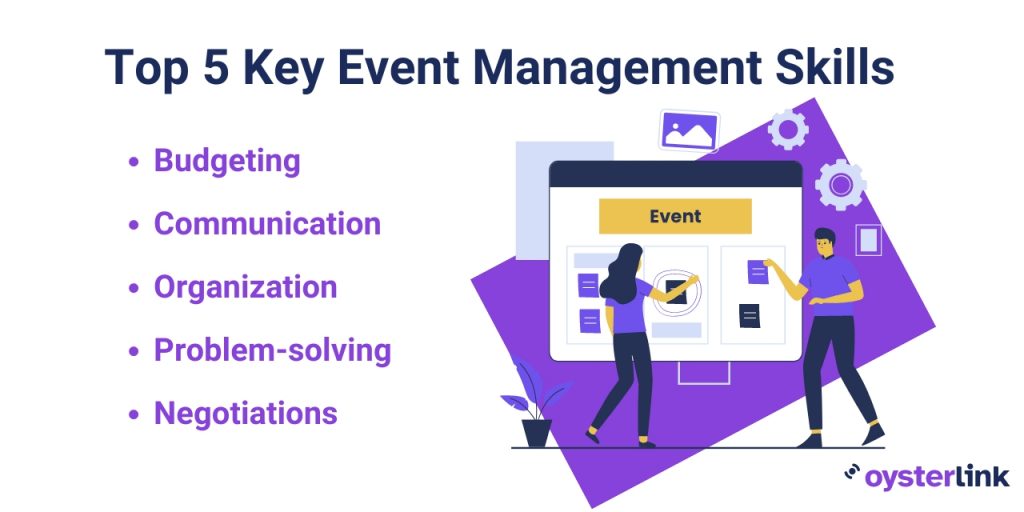Starting a career in event management is both challenging and rewarding. Given that the event industry is estimated to reach more than $150,000 million by 2032, it doesn’t come as a surprise that more and more people are getting into the field.
Unlike other hospitality careers that require extensive experience, starting off in the event management industry is considered relatively easy. In this article, you’ll learn which steps to take to not only get into event planning with zero experience but also which are some of the most profitable and rewarding roles.
Things To Consider When Starting Off in Event Management
Just like every other industry, being a part of the event planning sector has its pros and cons. For starters, if you’re a people person who thrives in a fast-paced environment, you’ll most probably love this job. You’ll get to build connections in all walks of life, which can significantly advance your career.
However, it’s also worth noting that event planning also involves working under pressure and a lot of stress. You might be tasked with responsibilities beyond your job role and juggling multiple things at the same time. If you’re not physically and mentally ready for a dynamic role in the event industry, you might find it overwhelming.
Roles in Event Management
To get into the field, consider becoming an Event Coordinator. To succeed in this role, you should have excellent time management and organizational skills. Even though Event Coordinator is usually considered an entry-level role, they work closely with managers and their role is crucial in preparing a successful event.
After spending a couple of years as an Event Coordinator, you will be eligible to become an Event Planner. As an Event Planner, you will be tasked with more serious responsibilities such as conducting market research, communicating with vendors and ensuring client satisfaction.
Ultimately, if you spend a lot of time in the event management industry, you will advance to an Event Manager. This role is more demanding as it involves great attention to detail and someone who has a clear vision of how to plan an event from start to finish.
How To Get Into Event Management With No Experience
If you want to start your career as an Event Coordinator and work your way up to become a powerful figure such as Vice President of Events or Chief Event Officer, there are a couple of things you can start doing today:
1. Study marketing and public relations
Good marketing and PR campaigns play a major role in organizing a successful event. The best part is that these skills are 100% transferable to any job. For example, if you’ve worked in sales, customer service or project management, you already have a solid foundation of these skills. To improve your chances of landing your first job in the event planning sector, consider building on your existing knowledge.
2. Network with successful professionals
If you’re just starting out in the field, you can learn a lot about the industry from reputable professionals. If you don’t know anyone in your surroundings, you can attend events or seminars where these experts meet. LinkedIn is also a great place to participate in industry-specific discussions and connect with like-minded individuals as well as established professionals from reputable companies.
3. Work towards obtaining a certification
Those looking to take their first steps in the event management industry should consider obtaining a certification. You can reference some of the best universities that offer event management degrees or you can attend courses. Some employers would prefer hiring, for example, a non-experienced Event Coordinator with a certificate from a reputable institution than the one without.
Top 5 Must-Have Skills in the Event Management Industry
It’s important to focus on certain skills when working in the event management industry, as these can help you excel in your job and advance in your career.
- Budget management: Unlike the entry-level roles, as a planner or a manager, you will be expected to set up and manage the budget for the entire project.
- Communication skills: Your job will be to communicate with clients and vendors on a daily basis, which is why you should have great communication skills.
- Organizational skills: Organizing an event requires someone who can not only lay out the structure but also follow up consistently to ensure everything is running smoothly for the big day.
- Problem-solving skills: If you’re working in the event planning sector, you know by now that there’s often additional stress before the event takes place. To address these issues as soon as possible, you should be quick on your feet.
- Negotiation skills: You should excel at negotiation as you will be regularly dealing with stakeholders, vendors and suppliers.

Building a Profitable Career in Event Management
Event management is a thriving field that continues to attract talented workforce. Apart from being an exciting and growing sector, it’s also known for excellent compensation packages. If you’re just starting out, chances are that you will be making around $54,362 per year as an Event Coordinator.
However, as long as you’re improving your skills, you should have no problem taking on more responsibilities and becoming an Event Planner who makes $62,280 per year. Additionally, it’s worth adding that this is the industry average and the salary can significantly vary depending on the state in which you’re working.
More senior roles such as Event Managers earn $78,729 per year in the U.S. Other similar roles, such as Event Directors, Vice Presidents of Events or Chief Event Officers are entitled to even higher salaries and more lucrative bonuses that come alongside more responsibilities.
Additionally, some people in event management can earn extra compensation on top depending on their performance and whether the event is a success. In these cases, you can earn up to 50% of your annual yearly income just in bonuses alone.




